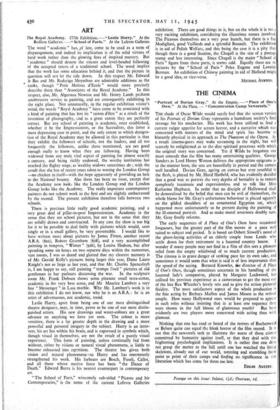THE CINEMA
THE shade of Oscar Wilde would surely feel that the screen version of his Portrait of Dorian Gray represents a humdrum society's final revenge for his mockeries. His work has been utilised to feed a current vulgar appetite for screen horror, and a narrative which was concerned with matters of the mind and spirit has become •as blatantly physical in its approach as The Phantom of the Opera. As a result cinema-goers may wake screaming in the night, but will scarcely be enlightened as to the dire spiritual processes with which the original story was concerned. Yet if Wilde be forgotten one must concede that the film has many entertaining qualities. George Sanders as Lord Henry Wotton delivers the appropriate epigrams as
m
to the manner born, the sets are beautifully in period and the camera well handled. Dorian Gray, ageing on canvas but ever youthful in the flesh, is played by Mr. Hurd Hatfield, who has evidently decided that a good way to portray the very depths of bestiality is to remain completely inanimate and expressionless and to talk like Miss Katharine Hepburn. In order that no disciple of Hollywood, shall be demoralised by the belief that men can be evil of themselves, the whole blame for Mr. Gray's unfortunate behaviour is placed squarely on the gilded shoulders of an ornamental Egyptian cat, which happened most unfortunately to be present during the painting of the ill-omened portrait. And to make moral assurance doubly sure, Mr. Gray finally reforms.
The early sequences of A Place of One's Own have occasional longueurs, but the greater part of the film moves at a pace well suited to subject and period. It is based on Osbert Sitwell's novel of the ghost-laying activities of an elderly couple from Leeds who settle down for their retirement in a haunted country house. I wonder if many people may not find in. a film of this sort a pleasant relief from the empty whirlwind of so much current production. The cinema is in grave danger of seeking pace for its own sake, and sometimes it would seem that what is said is of less importande than The speed of the saying. Bernard Knowles, the director of A Place of One's Own, though sometimes uncertain in his handling of the haunted lady's companion, played by Margaret Lockwood, has utilised his previous experience as a cameraman to get the most out of the late Rex Whistler's lovely sets and to give the action pictorial fluidity. The most satisfactory aspect of the whole production is the fine acting by Barbara Mullen and James Mason 'as the retired couple. How many Hollywood stars would be prepared to appear in such roles without insisting that in at least one sequence they were shown in the full bloom of glamorous youth? But here evidently are two players more concerned with acting than with
glamour. • Nothing that one has read or heard of the terrors of Buchenwald or Belsen quite can equal the bleak horror of the film record. It is not that the newsreels seek to illustrate the worst of these crimes committed by humanity against itself, or that they deal with the frightening psychological implications. It is rather that one does not grasp the matter to the full until one has watched the living skeletons, already out of our world, tottering and stumbling -from point 5o point of their camps and finding no significance in the liberation which has come for them too late.
ED0AR ANsmY.
Postage on this issue: Inland, ild.; Nerteas, Id






















 Previous page
Previous page